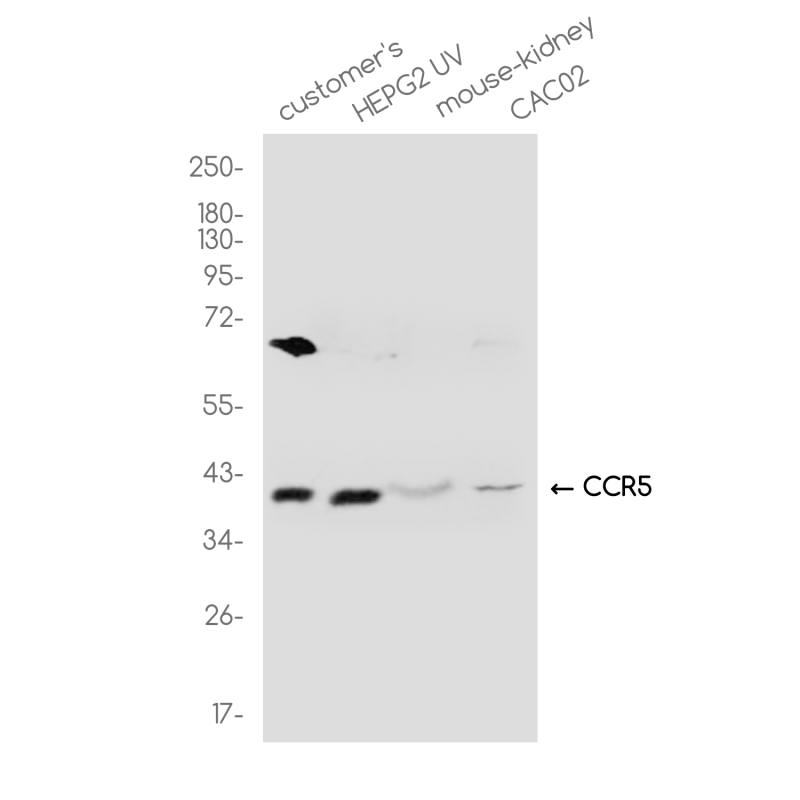
| WB | 咨询技术 | Human,Mouse,Rat |
| IF | 咨询技术 | Human,Mouse,Rat |
| IHC | 咨询技术 | Human,Mouse,Rat |
| ICC | 技术咨询 | Human,Mouse,Rat |
| FCM | 咨询技术 | Human,Mouse,Rat |
| Elisa | 1/10000 | Human,Mouse,Rat |
| Aliases | C-C chemokine receptor type 5 (C-C CKR-5; CC-CKR-5; CCR-5; CCR5; CHEMR13; HIV-1 fusion coreceptor; CD antigen CD195) |
| Entrez GeneID | 1234 |
| WB Predicted band size | Calculated MW: 41 kDa; Observed MW: 41 kDa |
| Host/Isotype | Rabbit IgG |
| Antibody Type | Primary antibody |
| Storage | Store at 4°C short term. Aliquot and store at -20°C long term. Avoid freeze/thaw cycles. |
| Species Reactivity | Human,Mouse,Rat |
| Immunogen | Synthesized peptide derived from human CCR5 Polyclonal |
| Formulation | Purified antibody in PBS with 0.05% sodium azide,0.5%BSA and 50% glycerol. |
+ +
以下是关于CCR5抗体的3篇代表性文献,按文献名称、作者和摘要内容整理:
---
1. **文献名称**:*PRO 140: A Humanized Anti-CCR5 Monoclonal Antibody for HIV-1 Therapy*
**作者**:Jacobson, J.M. et al.
**摘要**:该研究报道了一种人源化单克隆抗体PRO 140.通过靶向CCR5受体阻断HIV-1进入宿主细胞。临床试验显示,单次静脉注射可显著降低病毒载量,且耐受性良好,为HIV治疗提供了非抗逆转录病毒疗法的潜在选择。
2. **文献名称**:*CCR5 Blockade for Metastatic Colorectal Cancer: A Promising Immunotherapeutic Approach*
**作者**:Halama, N. et al.
**摘要**:研究探讨了CCR5抗体在结直肠癌中的作用,发现阻断CCR5可减少肿瘤微环境中的免疫抑制性细胞(如Tregs),增强抗肿瘤免疫反应,并在小鼠模型中抑制转移灶形成。
3. **文献名称**:*CCR5∆32 Mutation and Naturally Occurring Antibodies in HIV Resistance*
**作者**:Platt, E.J. et al.
**摘要**:文章分析了CCR5∆32突变纯合个体中天然抗体的作用,发现其血清中存在针对CCR5表位的抗体,可能通过阻断病毒结合或促进受体内吞增强对HIV感染的先天抵抗力。
---
**备注**:以上文献主题涵盖HIV治疗、癌症免疫治疗及天然抗体的作用机制,反映了CCR5抗体在疾病干预中的多样化应用。如需具体期刊信息或发表年份,可进一步补充检索。
CCR5. a chemokine receptor belonging to the G protein-coupled receptor (GPCR) family, is predominantly expressed on immune cells like T lymphocytes and macrophages. It plays a critical role in mediating immune cell migration and inflammation by interacting with chemokines such as CCL3. CCL4. and CCL5. CCR5 gained prominence due to its role as a co-receptor for HIV-1 entry into host cells. The discovery that individuals with a natural CCR5 Δ32 mutation exhibit resistance to HIV infection spurred interest in targeting this receptor for therapeutic intervention.
CCR5-blocking antibodies, such as leronlimab (PRO 140), have been developed to prevent HIV from binding to the receptor, effectively inhibiting viral entry. These antibodies show promise in both HIV treatment and pre-exposure prophylaxis (PrEP). Beyond virology, CCR5 is implicated in inflammatory diseases, autoimmune disorders, and cancer metastasis, broadening the therapeutic potential of its antibodies. For instance, CCR5 inhibition is being explored to mitigate graft-versus-host disease (GVHD) and inflammatory conditions like rheumatoid arthritis.
However, challenges persist, including variable patient responses and potential off-target effects. The CRISPR-edited CCR5 in the "Berlin patient" and "London patient" HIV cure cases highlighted both opportunities and risks, such as increased susceptibility to other infections. Despite setbacks like the hepatotoxicity of earlier small-molecule CCR5 antagonists (e.g., maraviroc), antibody-based strategies remain attractive due to their specificity and prolonged half-life, positioning CCR5 as a versatile target in precision medicine.
×